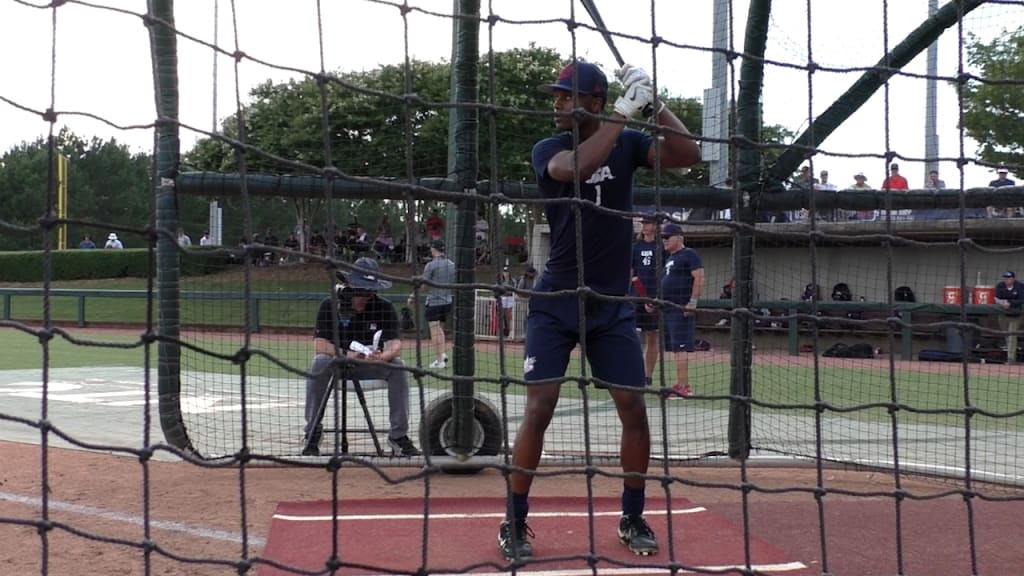SEC steals leader takes 80-grade speed to Baltimore
This browser does not support the video element.
This story was originally published on July 3. We have updated it to reflect Enrique Bradfield Jr. being drafted No. 17 overall by the Orioles.
At a time when Major League Baseball has begun to embrace its need for speed by increasing the size of the bases and limiting pitcher pickoffs, a 21-year-old Vanderbilt center fielder named Enrique Bradfield Jr. comes zipping onto the scene.
“It feels like fate,” Bradfield said.
Though Bradfield attended the MLB Draft Combine, he did not participate in the 30-yard sprint assessment. Still, it would be fair to speculate that he is the fastest player in this MLB Draft class, rating an 80 -- the upper crust of the scouting scale -- in the speed department. In three seasons at Vandy, he swiped 130 bags in 143 tries -- a staggering 90.9% success rate.
A native of South Florida, the 6-foot-1, 170-pound Bradfield, who was selected 17th overall by the Orioles in the 2023 Draft on Sunday, was born to be a burner. His Panamanian-born father played baseball at St. Thomas University and, though much bigger at 6-foot-3 and 220 pounds, was such an agile corner outfielder that teammates called him the “Panamanian Bo Jackson.” The younger Bradfield honed his own speed with footraces against his older sister Yarisbeth, who played soccer at American University.
“My sister was fast, and she would always beat me in races,” he said. “I was super competitive, so I’d get real upset when I’d lose. If I couldn’t beat her now, there’d be a huge problem.”
This browser does not support the video element.
Bradfield has speed that cannot be taught. But he needed the Vanderbilt experience to learn how to maximize it.
Vandy head coach Tim Corbin said Bradfield arrived to college “a baby deer in the headlights,” and left it a smart, bold baserunner.
“I didn’t even know if he’d play for us initially,” Corbin said of Bradfield. “Then as he went, his ability started to grow very quickly. In the middle of his freshman year, he started to develop the confidence to go and not concern himself with whether he was making the absolute best decision or whether he was going to get thrown out. It was just about getting him to go first and then giving him more help on how to do it, when to do it and certain tools to accentuate that.”
Bradfield, who went undrafted out of American Heritage School in Plantation, Fla., when teams weren’t willing to meet his price tag, credited not just the Vanderbilt coaching staff but also alum and current A’s second baseman Tony Kemp with helping him develop. He was a perfect 46-for-46 in steal attempts his sophomore season. Bradfield wasn’t able to repeat that this year (37-for-44 in 62 games), but he nevertheless led the SEC in steals, with 16 more than the second-place finisher.
“I told myself, ‘I’m going to steal every bag I can, and I don’t care if I get thrown out,’” Bradfield said. “I have nothing to be scared of. If I get thrown out, then I have to tip my cap to the pitcher, the catcher and the guy who tags me and leave it at that.”
With a left-handed swing, an ability to bunt for a hit and some sneaky pop, Bradfield amassed a .426 on-base percentage at Vandy to put himself in position for all those steals. But while the lofty stolen-base total jumps off the page, it’s the way Bradfield utilizes his speed in center that stands out to Corbin.
“The biggest value he brings is his defensive ability,” Corbin said. “He has the ability to go get a baseball and get it with athleticism. It sticks in his glove, he knows how to get to the ground without hurting himself, and when he dives for a ball, he comes up with it. And he goes over the fence to steal balls unlike anyone I’ve seen before. I just don’t think there are a lot of guys inside the game who play center field like this kid.”
Bradfield credits his penchant for dramatic defensive plays to his preparation, including power shags in the outfield during batting practice. He recalled one BP prior to a game against Arkansas when he scaled the wall in pursuit of a deep fly, got a glove on it … and dropped it.
He was demoralized.
“Everybody was laughing at me and giving me crap about it,” Bradfield said. “I was like, ‘I can’t believe I dropped it.’”
A few hours later, he got another shot -- this time on a fly ball that counted. And this time, he didn’t drop it.
“If I had to use one word to describe [robbing a home run], it’s electric,” Bradfield said. “It’s a really emotional moment. You sort of black out in the moment.”
Bradfield has a penchant for those electric, emotional moments. Like the time he stole home to tie a game against Indiana State with two out in the bottom of the ninth.
“I was in there without even a throw,” he said proudly.
If Bradfield is right about his fate, he’ll be bringing that speed to the big leagues someday soon.
“For me to be heading in the direction with the new rule changes, I think it’s a great thing,” he said. “I’m going to be able to help a team score a lot of runs.”

